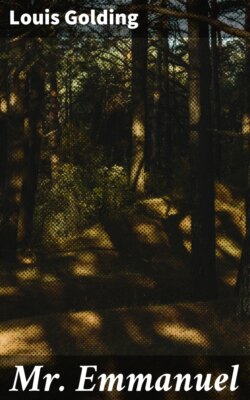Читать книгу Mr. Emmanuel - Louis Golding - Страница 8
На сайте Литреса книга снята с продажи.
I
ОглавлениеTable of Contents
Rose Cooper, whose letter Mr. Emmanuel had read up in Doomington with so much pleasure, had been Rose Cooper for a long time, though Mr. Emmanuel found it hard to think of her as anything but Rose Berman. The Magnolia Street people were all like that. They tended to think of those who had gone from among them as they once had been, rather than as they were now. Rose was one of two sisters who had lived with their mother at number three. The mother had died during the War; the other sister, who still lived at number three and had a home-made sweets shop there, was the Ada Hummel who had been tending Mr. Emmanuel since his bereavement. Rose was one of those Magnolia Street folk—they had been few—who had married on the opposite side of the street.
The young man’s name was John Cooper; his family, which was of gentler origin than most of their neighbours, lived at number six. He was in the merchant-service when he and Rose first became aware of each other; when they got married, late in the War, he was in command of a mine-sweeper in the Channel; and now, in 1935, he was the captain of a fruit cargo boat in the Blue Funnel Line plying between the Cape and Southampton. They lived in a house called Shipscar, some miles from Ringwood, in the New Forest. It had been hardly more than a cottage when they had gone to live there after their marriage, but it had become quite a house as the years had gone by, what with the various buildings-on and outhouses which John delighted to contrive during his periods of leave.
They had three daughters, and one son. The daughters were called one after Rose’s mother, one after John’s mother, and one just Ailsa, because they thought it a pleasant name. The son was called Dick, and it was exactly because the son was called Dick that another member of the Cooper family lived in that neighbourhood, in a cottage called Wain Cottage, three miles from Shipscar, on the edge of a heathery common. This was the boy’s aunt, Mary, the elder of John’s two sisters. John had had a brother, too, also called Dick, a golden-haired blue-eyed boy, a rough youngster despite his good looks. This boy had been greatly loved on both sides of Magnolia Street, whilst his sister, Mary Cooper, had had no existence apart from him. He had been, as it were, the breath in her lungs and the light in her eyes. He went to the War and survived it, but two years later somebody swiped him on the head in a football match, and in an hour or so the boy whom the embattled forces did not destroy—bombs and machine-gun bullets and shrapnel-shells—was dead. For years it seemed that for the most part Mary Cooper was dead too. She spent the greater part of the day sitting at the window of the ground-floor sitting-room. She became almost as much part of the inanimate furniture of Magnolia Street as the doorsteps and lamp-posts.
And then at last, in 1930, when John and Rose had a boy baby the infant succeeded where everything else had failed. Mary Cooper was induced to go to Shipscar, not on the plea that Rose needed her, but because the baby would be called Dick if she went, and anything, even Ebenezer, even Jeroboam, if she did not. Dick the Second wove the spell that had been anticipated. Mary Cooper did not return to Magnolia Street. The sale of the house provided her with almost as much money as was needed to buy Wain Cottage. Before the crash in her father’s fortunes which had sent him and his family hurtling into Magnolia Street, she had lived in the country with an aunt and a number of dogs. She now lived in the country again with a number of dogs and a nephew, or at least the greater part of a nephew. He was allowed to sleep at Shipscar and his mother would often see him during the day for as much as an hour or two at a stretch.
The long Magnolia Street years had gone, like the mist on a mirror. She was happy enough. She had this second Dick, and the family, and dogs, and an acre or two of rough garden with a stream in it. But there were times when ghosts came up from the crystal depths of the mirror. Sometimes it was a youthful ghost, with a flicker of yellow hair and blue eyes; and when this apparition shook and swung in the depths, she would seize Dick in her arms and press him so close to her bosom that she hurt and frightened him. But mostly she was sensible. She did not spoil him, or her brother John would have put his foot down soon and hard.
Now and again other ghosts from that in-between time came up and smiled, or mouthed a word or two, and disappeared. The most amiable of these was that tall Mr. Emmanuel, with the little pointed beard, and the pince-nez, and the head that swung to and fro. She sometimes hoped they might see each other again, but that did not seem likely; it was a long way from Ringwood in the New Forest to Magnolia Street in Doomington.
